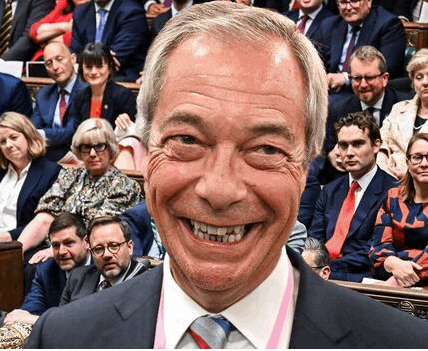Reform UK’s leader took aim at the Tories, who introduced the legislation in the last Parliament.

Reform UK leader and MP for Clacton Nigel Farage (Image: Getty)
Nigel Farage has delivered a sharp rebuke to Kemi Badenoch’s Conservative Party over the controversial Online Safety Act, declaring: “The Conservatives should be in hiding”. The Reform UK leader posted the six-word verdict on X on Sunday, directing his criticism at the Conservatives amid a growing backlash over the new law’s impact on free speech and online censorship.
Farage’s comment comes amid ongoing controversy surrounding the Online Safety Act, legislation designed to regulate harmful content online but widely condemned by critics for overreach and threats to free expression. At the centre of the row is an op-ed by Shadow Home Secretary Chris Philp published in The Times in 2022, headlined: “Online safety bill poses no threat to free speech.” Mr Philp, who served as Minister for Tech and Digital, argued at the time the Bill’s measures were necessary to protect users—particularly children—from harmful content, without impinging on free speech rights.

Reform UK chairman Zia Yusuf (Image: Getty)
However, detractors say the legislation has already begun censoring legitimate political content and protests, sparking accusations of authoritarianism.
Mr Farage posted on X, saying: “The @Conservatives should be in hiding. Never forget who they really are.”
At the weekend, Zia Yusuf, the head of Reform UK’s Department of Government Efficiency, escalated the criticism in a lengthy post, also on X, in which he described the Online Safety Act, which was passed in 2023, as “the biggest ever assault on free speech in the UK,” and pointed to instances where footage of protests against migrant hotels – for example at the Bell Hotel in Epping – has been removed under the new rules.
Mr Yusuf said: “Already the ‘Online Safety Act’ is censoring footage of protests against migrant hotels, and the Government that loves locking people up for speech is forcing people to scan their faces and IDs.”
He further condemned the Bill’s provisions requiring platforms to scan private messages, break end-to-end encryption, and demand ID verification just to browse the web.
Mr Yusuf said: “This Tory monstrosity hands unelected bureaucrats sweeping powers to censor content they disapprove of, forcing platforms to scan private messages, break end-to-end encryption, and demand ID just to browse the web.”
He warned this “power grab” would stifle dissent and push vulnerable users towards the dark web, away from regulated platforms where safety mechanisms exist.
Mr Yusuf added: “This was never about protecting children. It empowers authoritarians to silence anyone challenging the establishment narrative.”
Highlighting political hypocrisy, Mr Yusuf called out senior Conservatives Robert Jenrick and Suella Braverman as the architects of what he called an “Orwellian nightmare.” He accused them of posing as “right-wing champions” while ultimately betraying free speech principles.
Since its introduction, the Online Safety Act has been a contentious piece of legislation. Designed to tackle online harms such as hate speech, terrorism content, and child exploitation, the law places new duties on social media firms, search engines, and other digital platforms.
Of particular concern to critics are provisions that grant the regulator Ofcom the power to impose fines and enforce compliance, including demands to remove content deemed harmful.
One of the most controversial elements is the bill’s stance on encryption. The Act allows regulators to require platforms to weaken or remove end-to-end encryption, which privacy advocates warn could jeopardise secure communications and user privacy.
Civil liberties groups and tech companies have voiced opposition, saying the law risks censoring legitimate speech, invading privacy, and undermining digital security.
The Government insists the law is necessary to create a safer online environment, particularly for children and vulnerable groups. They argue the legislation balances the need for protection with free speech safeguards.
Yet, as the law’s implementation progresses, incidents of content removal related to peaceful protests and politically sensitive topics have intensified concerns among free speech advocates.
Nigel Farage’s terse condemnation signals growing frustration within certain right-wing circles, who see the Conservative Government as abandoning core freedoms in pursuit of greater control over the internet.
Mr Farage’s message resonates with Reform UK’s stance and wider unease among libertarian-leaning voices who view the Online Safety Act as a step toward state censorship and digital authoritarianism.
The debate over how to regulate online speech without stifling dissent or privacy rights is far from settled. But as the law takes effect, political divisions are sharpening, with the Conservative Party facing criticism not just from Opposition parties but also from former allies and public commentators.
A government spokesperson said: “Free speech is fundamental to our democracy and we’ve taken robust action to protect it, including through the Online Safety Act.
“The Act protects UK citizens by tackling disturbing illegal content like child sexual material and content harmful to children including suicide and self-harm material. This represents the biggest step change in young people’s online experience since the internet was created, providing a safer internet where children can explore its benefits without anxiety over what might be behind the next swipe.
“As set out in our Plan for Change, we are committed to giving children the best start in life, and protecting them from harm online is fundamental to achieving this mission.”


